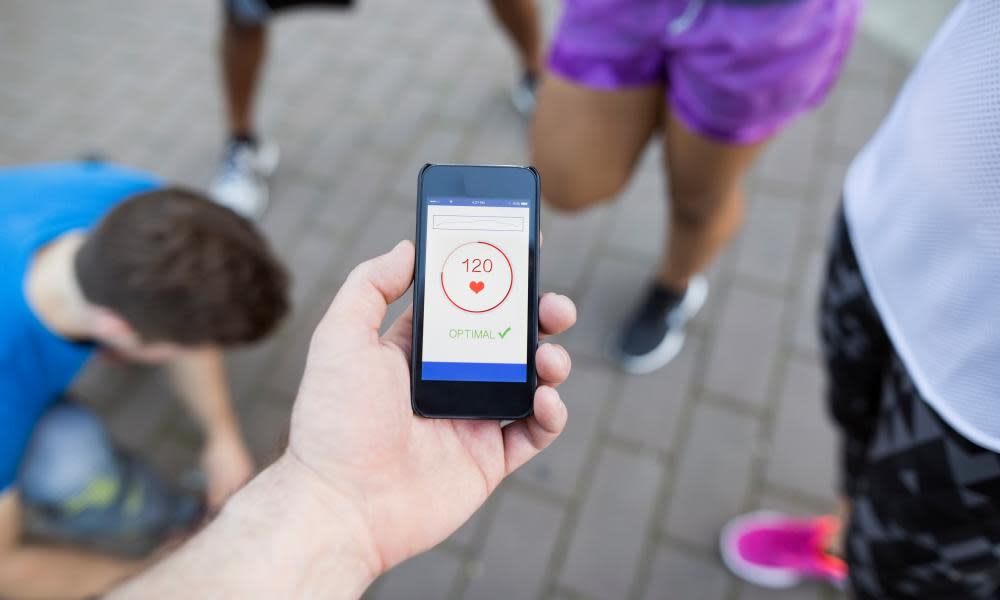Health apps could be doing more harm than good, warn scientists

Fitness trackers and mental health apps could be doing more harm than good because they are not based on sound science, researchers have warned, comparing some health app developers to “snake oil salesmen of the 1860s”.
Greg Hager, professor of computer science at Johns Hopkins University, said that in the absence of trials or scientific grounding it was impossible to say whether apps were having the intended effect.
“I am sure that these apps are causing problems,” he told the American Association for the Advancement of Science annual meeting in Boston. Hager cited the one-size-fits-all targets provided by some fitness trackers, such as the Fitbit, which sets users a goal of taking 10,000 steps a day.
Hager claimed the 10,000 steps target dated back to a 1960s Japanese study that showed there were health benefits for men who burned at least 2,000 calories per week through exercise – roughly equivalent to 10,000 steps each day. An early pedometer was known as the manpo-kei, which means “10,000-step meter” in Japanese.
“But is that the right number for any of you in this room?” Hager asked. “Who knows. It’s just a number that’s now built into the apps.”
“We have an incredible number of apps in the wild basically being downloaded by people who may or may not understand what they are actually telling them or what the context for that is,” he said. “Until we have evidence-based apps you could amplify issues. I mean, imagine everyone thinks they have to do 10,000 steps but you are not actually physically capable of doing that, you could actually cause harm or damage by doing so.”
However, others suggested that the fears had been overblown.
Prof John Jakicic, of the University of Pittsburgh, whose team last year found that fitness trackers did not help people lose weight, said: “We need to be careful about relying solely on these devices. However, there is a place for these, and so we need to be careful not to throw the baby out with the bathwater, in my opinion.”
Simon Leigh, a health economist at the University of Liverpool, said that of far greater concern were health apps that made recommendations about medication, such as adjusting insulin dosage.
“These have the huge opportunity for error,” he said. “Exercise apps on the whole may result in a small number of incidents, but in general they are promoting healthy behaviours. So the opportunity for damage, although increased for some, such as diabetics who suddenly up their exercise, is likely to be minimal.”
Fitbit ambassador and former Olympian, Greg Whyte, said: “As 10,000 steps equates to around five to six miles, which will take around two hours, it is a daily target and not necessarily a single exercise session target.”
He added that over reliance on wearable tech could be a problem. “Remember, your tech works for you, not the other way around,” he said.
The Fitbit website states that the 10,000 target was designed to match the US Centers for Disease Control and Prevention’s (CDC) recommendation that adults should exercise for at least 150 minutes each week, and also notes that this target might not be suitable for those new to exercise.
The number of healthcare apps has soared in recent years, with more than 165,000 health-related apps available on the Apple store, including ones that offer to monitor blood pressure, calculate insulin doses for diabetics and encourage mindfulness exercises.
“Very few of them are science-based in the tradition of how we would think of doing science-based medicine,” said Hager.
Steve Flatt, director of the Psychological Therapies Unit in Liverpool, said that while some mental health apps were well researched and could offer benefits, the field as a whole was “in the equivalent stage of the 1860s wild west”
“Everyone sees a gravy train and are not hesitating to jump on board even if there is little of no evidence of utility, on the basis that there is a vast amount of money to be made,” he said. “This field is currently in its infancy and can be likened to the snake oil salesmen of the 1860s,” he added. “Originally, snake oil was an effective Chinese remedy for aching joints and inflammation. Then it was ripped off by unscrupulous fraudsters.”

 Yahoo News
Yahoo News 
